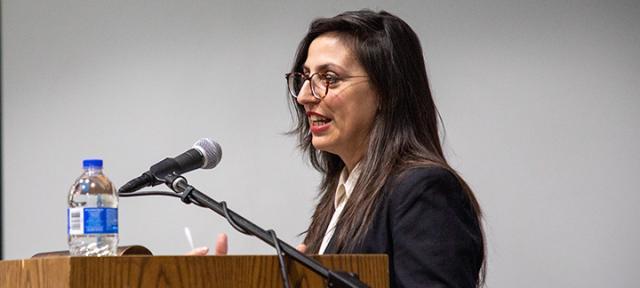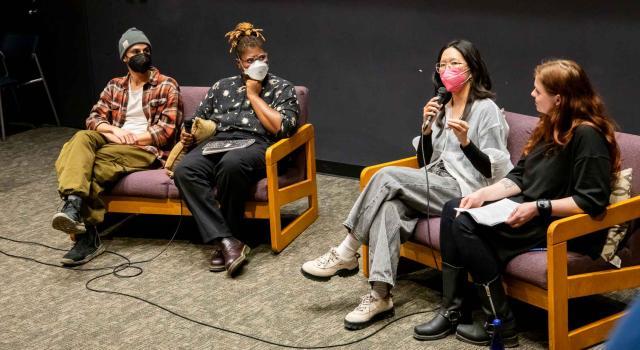14th Annual Schocket Lecture Features the Feminist Theorist and Activist Verónica Gago

On April 12, Hampshire presented “A Feminist Reading of Debt: Finances, Violence, and Territories” in Franklin Patterson Hall. Audiences could hear Verónica Gago speak either in person or by Zoom.
The College was pleased to welcome the activist, theorist, and author Verónica Gago to campus to discuss her work. Professors and students from all five colleges were excited to have the opportunity to hear her speak.
Gago is a leader in Argentina’s #NiUnaMenos (Not One Less!) movement — a regional mobilization effort to counter femicide and support reproductive rights. She teaches political science at the University of Buenos Aires and is professor of sociology at the Instituto de Altos Estudios Nacional, Universidad Nacional de San Martín. As an investigator at the National Council of Research, Gago is also part of the Group for Feminist Research and Intervention. She currently teaches in New York City.
In her presentation, Gago explored her work as part of an international feminist movement in Latin America. As a founding organizer of the International Women’s Strike in 2017, she is committed to demonstrations to bring attention to issues that are gender-based and beyond — that is, all marginalized groups. Discussing the activism of strikes, Gago articulated the desire to expand the definition of workers to be more inclusive (for example, migrant and domestic workers, the unemployed, those who are retired, and students): “A strike becomes general only once it is feminist,” she said. Each strike connects the movement to previous strikes through what Gago described as “activation of feminist memories.”
Gago is the author of Neoliberalism from Below: Popular Pragmatics and Baroque Economies (Duke University Press, 2017), Feminist International: How to Change Everything (Verso, 2020), and A Feminist Reading of Debt, with Lucí Cavallero (Pluto Press, 2022). In her most recent book, she focuses on the ways debt perpetuates violence against women — for instance, a spouse who can’t leave a domestic-abuse situation or has to take on dangerous work because of financial dependence.
Gago’s overarching slogan is “We want ourselves alive, free, and out of debt.”
This lecture series honors the late Eric N. Schocket, who taught American literature at Hampshire College from 1996 until his death, in 2006. A much-admired teacher and colleague, Schocket taught courses that inspired a generation of students. Nationally, he was a leading figure in working-class studies. His writings on Herman Melville, Rebecca Harding Davis, William Dean Howells, and Langston Hughes engaged the important relationship between class and culture. His Vanishing Moments: Class and American Literature (University of Michigan Press) was published in 2006.



